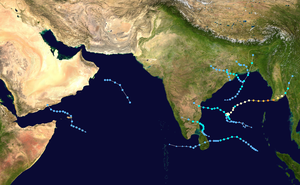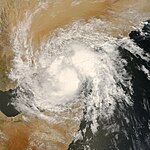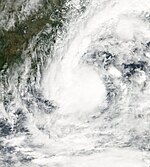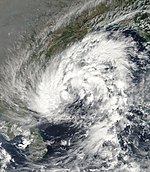2008 North Indian Ocean cyclone season
| 2008 North Indian Ocean cyclone season |

Season summary map
|
| Seasonal boundaries |
| First system formed |
April 27, 2008 |
| Last system dissipated |
December 8, 2008 |
| Strongest storm |
|
| Name |
Nargis |
| • Maximum winds |
165 km/h (105 mph)
(3-minute sustained) |
| • Lowest pressure |
962 hPa (mbar) |
| Seasonal statistics |
| Depressions |
10 |
| Deep depressions |
7 |
| Cyclonic storms |
4 |
| Severe cyclonic storms |
1 |
| Very severe cyclonic storms |
1 |
| Total fatalities |
At least 140,442 |
| Total damage |
~ $14.7 billion (2008 USD) |
| Related articles |
|
|
North Indian Ocean tropical cyclone seasons
2006, 2007, 2008, 2009, 2010
|
| Extremely severe cyclonic storm (IMD) |
| Category 4 tropical cyclone (SSHWS) |
|
|
| Duration |
April 27 – May 3 |
| Peak intensity |
165 km/h (105 mph) (3-min) 962 hPa (mbar) |
| Depression (IMD) |
|
|
| Duration |
June 5 – June 7 |
| Peak intensity |
45 km/h (30 mph) (3-min) 994 hPa (mbar) |
| Depression (IMD) |
|
|
| Duration |
June 16 – June 18 |
| Peak intensity |
45 km/h (30 mph) (3-min) 988 hPa (mbar) |
| Depression (IMD) |
|
|
| Duration |
August 9 – August 10 |
| Peak intensity |
45 km/h (30 mph) (3-min) 1004 hPa (mbar) |
| Deep depression (IMD) |
| Tropical storm (SSHWS) |
|
|
| Duration |
September 15 – September 19 |
| Peak intensity |
55 km/h (35 mph) (3-min) 986 hPa (mbar) |
| Deep depression (IMD) |
| Tropical depression (SSHWS) |
|
|
| Duration |
October 19 – October 23 |
| Peak intensity |
55 km/h (35 mph) (3-min) 1000 hPa (mbar) |
| Cyclonic storm (IMD) |
| Tropical storm (SSHWS) |
|
|
| Duration |
October 25 – October 27 |
| Peak intensity |
85 km/h (50 mph) (3-min) 996 hPa (mbar) |
| Cyclonic storm (IMD) |
| Tropical storm (SSHWS) |
|
|
| Duration |
November 13 – November 16 |
| Peak intensity |
65 km/h (40 mph) (3-min) 996 hPa (mbar) |
| Cyclonic storm (IMD) |
| Tropical storm (SSHWS) |
|
|
| Duration |
November 25 – November 29 |
| Peak intensity |
85 km/h (50 mph) (3-min) 996 hPa (mbar) |
The 2008 North Indian cyclone season was one of the most disastrous seasons in modern history, with tropical cyclones leaving more than 140,000 people dead and causing nearly US$14 billion in damage. The season has no official bounds but cyclones tend to form between April and December. These dates conventionally delimit the period of each year when most tropical cyclones form in the northern Indian Ocean. There are two main seas in the North Indian Ocean—the Bay of Bengal to the east of the Indian subcontinent and the Arabian Sea to the west of India. The official Regional Specialized Meteorological Centre in this basin is the India Meteorological Department (IMD), while the Joint Typhoon Warning Center releases unofficial advisories. An average of four to six storms form in the North Indian Ocean every season with peaks in May and November. Cyclones occurring between the meridans 45°E and 100°E are included in the season by the IMD.
During 2008, the IMD monitored a total of ten depressions across the North Indian Ocean, significantly below the average of fifteen. Of these systems, seven developed into deep depressions, four into cyclonic storms, and one into a very severe cyclonic storm. The JTWC unofficially tracked seven systems, with six having one-minute sustained winds greater than 65 km/h (40 mph), slightly above their 32-year average of five. Activity was mostly limited to the Bay of Bengal, with only two depressions developing in the Arabian Sea. Somewhat unusually, no depression developed during the month of July due to the lack of a prominent monsoon. Collectively, there were a total of 30 days of activity in the basin, with no storms existing simultaneously.
The first and most destructive storm of the season, Cyclone Nargis struck the Irrawaddy Delta in southern Myanmar, with a 3 to 5 m (9.8 to 16.4 ft) storm surge. Approximately 800,000 homes were severely damaged or destroyed and infrastructure was devastated. An estimated 140,000 people lost their lives and damage reached 11.7 trillion Burmese kyat (US$12.9 billion). Nargis is regarded as the worst disaster in the nation's history as well as the fourth-deadliest tropical cyclone on record. Other storms throughout the season caused significant damage in Bangladesh, India, Sri Lanka, and Yemen. A depression in October was responsible for 180 deaths and US$1 billion in damage across Yemen. Overall, approximately 140,442 people were killed and losses totaled to $14.7 billion.
...
Wikipedia


















